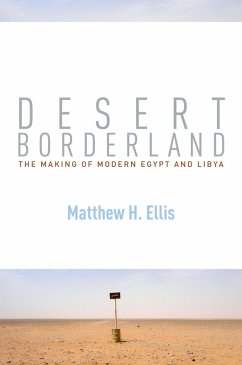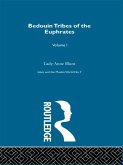24,95 €
24,95 €
inkl. MwSt.
Sofort per Download lieferbar

12 °P sammeln
24,95 €
Als Download kaufen

24,95 €
inkl. MwSt.
Sofort per Download lieferbar

12 °P sammeln
Jetzt verschenken
Alle Infos zum eBook verschenken
24,95 €
inkl. MwSt.
Sofort per Download lieferbar
Alle Infos zum eBook verschenken

12 °P sammeln
- Format: ePub
- Merkliste
- Auf die Merkliste
- Bewerten Bewerten
- Teilen
- Produkt teilen
- Produkterinnerung
- Produkterinnerung

Bitte loggen Sie sich zunächst in Ihr Kundenkonto ein oder registrieren Sie sich bei
bücher.de, um das eBook-Abo tolino select nutzen zu können.
Hier können Sie sich einloggen
Hier können Sie sich einloggen
Sie sind bereits eingeloggt. Klicken Sie auf 2. tolino select Abo, um fortzufahren.

Bitte loggen Sie sich zunächst in Ihr Kundenkonto ein oder registrieren Sie sich bei bücher.de, um das eBook-Abo tolino select nutzen zu können.
Desert Borderland investigates the historical processes that transformed political identity in the easternmost reaches of the Sahara Desert in the half century before World War I. Adopting a view from the margins-illuminating the little-known history of the Egyptian-Libyan borderland-the book challenges prevailing notions of how Egypt and Libya were constituted as modern territorial nation-states.
Matthew H. Ellis draws on a wide array of archival sources to reconstruct the multiple layers and meanings of territoriality in this desert borderland. Throughout the decades, a heightened…mehr
- Geräte: eReader
- mit Kopierschutz
- eBook Hilfe
- Größe: 6.39MB
Andere Kunden interessierten sich auch für
![Corporate Conquests (eBook, ePUB) Corporate Conquests (eBook, ePUB)]() C. Patterson GierschCorporate Conquests (eBook, ePUB)28,95 €
C. Patterson GierschCorporate Conquests (eBook, ePUB)28,95 €![Bedouin Tribes of the Euphrates (eBook, ePUB) Bedouin Tribes of the Euphrates (eBook, ePUB)]() Bedouin Tribes of the Euphrates (eBook, ePUB)143,95 €
Bedouin Tribes of the Euphrates (eBook, ePUB)143,95 €![The Lynching of Mexicans in the Texas Borderlands (eBook, ePUB) The Lynching of Mexicans in the Texas Borderlands (eBook, ePUB)]() Nicholas Villanueva Jr.The Lynching of Mexicans in the Texas Borderlands (eBook, ePUB)24,95 €
Nicholas Villanueva Jr.The Lynching of Mexicans in the Texas Borderlands (eBook, ePUB)24,95 €![Egypt's Occupation (eBook, ePUB) Egypt's Occupation (eBook, ePUB)]() Aaron G. JakesEgypt's Occupation (eBook, ePUB)21,95 €
Aaron G. JakesEgypt's Occupation (eBook, ePUB)21,95 €![Street Sounds (eBook, ePUB) Street Sounds (eBook, ePUB)]() Ziad FahmyStreet Sounds (eBook, ePUB)22,95 €
Ziad FahmyStreet Sounds (eBook, ePUB)22,95 €![Unknown Past (eBook, ePUB) Unknown Past (eBook, ePUB)]() Hanan HammadUnknown Past (eBook, ePUB)19,95 €
Hanan HammadUnknown Past (eBook, ePUB)19,95 €![Police Encounters (eBook, ePUB) Police Encounters (eBook, ePUB)]() Ilana FeldmanPolice Encounters (eBook, ePUB)19,95 €
Ilana FeldmanPolice Encounters (eBook, ePUB)19,95 €-
-
-
Desert Borderland investigates the historical processes that transformed political identity in the easternmost reaches of the Sahara Desert in the half century before World War I. Adopting a view from the margins-illuminating the little-known history of the Egyptian-Libyan borderland-the book challenges prevailing notions of how Egypt and Libya were constituted as modern territorial nation-states.
Matthew H. Ellis draws on a wide array of archival sources to reconstruct the multiple layers and meanings of territoriality in this desert borderland. Throughout the decades, a heightened awareness of the existence of distinctive Egyptian and Ottoman Libyan territorial spheres began to develop despite any clear-cut boundary markers or cartographic evidence. National territoriality was not simply imposed on Egypt's western-or Ottoman Libya's eastern-domains by centralizing state power. Rather, it developed only through a complex and multilayered process of negotiation with local groups motivated by their own local conceptions of space, sovereignty, and political belonging. By the early twentieth century, distinctive "Egyptian" and "Libyan" territorial domains emerged-what would ultimately become the modern nation-states of Egypt and Libya.
Matthew H. Ellis draws on a wide array of archival sources to reconstruct the multiple layers and meanings of territoriality in this desert borderland. Throughout the decades, a heightened awareness of the existence of distinctive Egyptian and Ottoman Libyan territorial spheres began to develop despite any clear-cut boundary markers or cartographic evidence. National territoriality was not simply imposed on Egypt's western-or Ottoman Libya's eastern-domains by centralizing state power. Rather, it developed only through a complex and multilayered process of negotiation with local groups motivated by their own local conceptions of space, sovereignty, and political belonging. By the early twentieth century, distinctive "Egyptian" and "Libyan" territorial domains emerged-what would ultimately become the modern nation-states of Egypt and Libya.
Dieser Download kann aus rechtlichen Gründen nur mit Rechnungsadresse in A, D ausgeliefert werden.
Produktdetails
- Produktdetails
- Verlag: Stanford University Press
- Seitenzahl: 280
- Erscheinungstermin: 20. März 2018
- Englisch
- ISBN-13: 9781503605572
- Artikelnr.: 51457497
- Verlag: Stanford University Press
- Seitenzahl: 280
- Erscheinungstermin: 20. März 2018
- Englisch
- ISBN-13: 9781503605572
- Artikelnr.: 51457497
Matthew H. Ellis is the Christian A. Johnson Endeavor Foundation Chair in Middle Eastern Studies and International Affairs at Sarah Lawrence College.
Contents and Abstracts
Introduction: Rethinking Territorial Egypt
chapter abstract
The Introduction lays out the book's central argument about territoriality.
I argue that Egypt constitutes an important case study given that it
assumed more territorial definition as a modern nation-state in the late
nineteenth century despite the absence of demarcated borders or clear-cut
cartographic evidence. I seek to challenge prevailing historiography on
territoriality that emphasizes the salience of border treaties and
authoritative representational practices such as mapping, by showing
instead the range of mechanisms that undergirded the projection of
centralized territoriality in the nineteenth century. This argument has
implications well beyond Egypt: territoriality as practiced-which we can
glimpse by uncovering the lived experience of territoriality across the
variegated domains of state space-was always a multilayered process of
negotiation between an array of state and nonstate actors.
1Legal Exceptionalism in Egypt's Borderlands
chapter abstract
This chapter opens with a brief overview of the historical geography of the
Egyptian West, highlighting the diversity within the region's human and
physical landscapes. It then moves on to illustrate the uneven political
geography of the Egyptian nation-state in the late nineteenth century by
highlighting two salient themes: the persistence of legal exceptionalism in
the western oases and other desert territories, even after Egypt's
state-wide judicial reforms starting in the 1870s; and the state's fraught
efforts to standardize its policy vis-à-vis Egypt's bedouin population
around the country. Both these themes illustrate the emergence of Egypt's
borderlands as enclaves of exceptionalism within the emergent Egyptian
nation-state. Accordingly, the chapter questions prevailing notions of
territorial sovereignty in the nineteenth century and argues against
normative Euro-centric top-down frameworks for understanding the process of
state-building in the period.
2Accommodating Egyptian Sovereignty in Siwa
chapter abstract
This chapter takes us to Siwa-the westernmost oasis in Egypt, which
acquired an almost mythic status as Egypt's final frontier during the
nineteenth century. The chapter zooms in on the Siwan political scene in
the 1890s, when the Egyptian state intensified its efforts to unify its
ruling authority across its various territorial domains. In contrast to the
normative accounts of state centralization and local resistance, the
chapter explores how a variety of local, nonstate actors-the Sanusiyya,
foremost among them-played a crucial mediating role in the Egyptian
government's effort to exercise sovereignty over Siwa in this critical
decade. The chapter illustrates this dynamic by focusing on the local
negotiations of power between state and nonstate actors in Siwa that
resulted in the formalization of the traditional Siwan elite's customary
authority.
3'Abbas Hilmi II and the Anatomy of a Siwan Murder
chapter abstract
This chapter advances the book's argument about territoriality by examining
the layers of contested sovereignty in Siwa after the Khedive 'Abbas
Hilmi's historic visit to the oasis in 1906. In part through his Da'ira
Khassa (the administration of the Khedivial properties), the Khedive
mobilized a network of political operatives to serve his own political
designs and project his sovereign authority and legitimacy far and wide. In
Siwa, this took the form of buying up local property, building a grand new
mosque, and providing employment for the Siwan population at large. The
Khedive also successfully integrated his private network into the
traditional hierarchy of local shaykhs in the oasis. This allowed him to
garner sovereignty legitimacy where the colonial Egyptian government
failed-a development that is thrown into relief with my careful
reconstruction of a little-known Siwan murder case in 1909.
4Cultivating Territorial Sovereignty in the Western Desert
chapter abstract
Chapter 4 explores the relationship between territoriality and economic
development in late-nineteenth-century Egypt. It argues that this period
witnessed a raft of projects aimed at what, in the French colonial context,
was called mise en valeur-the reclamation of barren, unprofitable land.
After surveying a number of such projects undertaken under the auspices of
the Egyptian government, the chapter then turns its attention to the
Khedive's own grand development schemes in the Egyptian West. Foremost
among these was the Maryut Railway, which he intended to run from the
outskirts of Alexandria all the way to the Libyan border. The Maryut
Railway functioned as one of several projects through which the Khedive
sought to transform the Egyptian West into a more personalized realm of
territorial sovereignty. In this regard, the Khedive strove to outdo the
British Residency at its own logic of "economism" as a doctrine of ruling
legitimacy.
5The Limits of Ottoman Sovereignty in the Eastern Sahara
chapter abstract
This chapter documents the emergence of the Eastern Sahara as a contested
borderland zone, marked by a nascent political rivalry between the Ottoman
state and the "autonomous province" of Egypt. The view from the borderland
allows us to glimpse fundamental limitations in the Ottoman exercise of
sovereignty in the Eastern Sahara, particularly as Egypt acted increasingly
as an independent centralizing state in its own right. Through its analysis
of bedouin mobility across the invisible Egyptian-Libyan border, the
chapter demonstrates that the tribes stood to gain a great deal by
negotiating the onset of state power, alternately claiming or ignoring the
existence of a border depending on their particular needs and interests at
a given moment. Territorialization in the Eastern Sahara was thus a direct
consequence of bedouin spatial practices, which threw into relief the
vacuum in state authority at this marginal space between Ottoman Libyan and
Egyptian sovereignty.
6The Emergence of Egypt's Western Border Conflict
chapter abstract
This chapter documents the emergence of a bona fide "border crisis" in the
Eastern Sahara in the decade prior to the Italian occupation of Ottoman
Libya. Through a nuanced investigation of a range of primary sources, the
chapter illustrates the interactive and multilayered process through which
a sharper sense of borderland territorialization-a sense of there being
distinctive Libyan and Ottoman territorial spheres-emerged in these pivotal
years. Bedouin spatial practices were again central, drawing the Ottoman
and Egyptian states deeper into political-diplomatic rivalry, while the
Italian state seized upon the instability caused by the bedouin unrest to
stake its own territorial claims. In this decade of heated inter-imperial
rivalry and contestation, Egyptian sovereign capabilities emerged as
ascendant in the region, to the deep chagrin of local Ottoman officials.
Conclusion: Unsettling the Egyptian-Libyan Border
chapter abstract
The conclusion uses a variety of archival materials to document the fraught
diplomatic negotiations that took place between the Italian and Egyptian
governments from the end of World War I until 1925-26, when a border
delimitation agreement was finally signed. At the same time, however, the
chapter illustrates the limitations of this agreement-how it actually left
much unsettled in the borderland in terms of national citizenship and
belonging. The book ends with a meditation on how the mechanisms of
territorial nation-statehood still seem elusive in this region, which again
wrestles with the mobility of the local population as a destabilizing
force.
Introduction: Rethinking Territorial Egypt
chapter abstract
The Introduction lays out the book's central argument about territoriality.
I argue that Egypt constitutes an important case study given that it
assumed more territorial definition as a modern nation-state in the late
nineteenth century despite the absence of demarcated borders or clear-cut
cartographic evidence. I seek to challenge prevailing historiography on
territoriality that emphasizes the salience of border treaties and
authoritative representational practices such as mapping, by showing
instead the range of mechanisms that undergirded the projection of
centralized territoriality in the nineteenth century. This argument has
implications well beyond Egypt: territoriality as practiced-which we can
glimpse by uncovering the lived experience of territoriality across the
variegated domains of state space-was always a multilayered process of
negotiation between an array of state and nonstate actors.
1Legal Exceptionalism in Egypt's Borderlands
chapter abstract
This chapter opens with a brief overview of the historical geography of the
Egyptian West, highlighting the diversity within the region's human and
physical landscapes. It then moves on to illustrate the uneven political
geography of the Egyptian nation-state in the late nineteenth century by
highlighting two salient themes: the persistence of legal exceptionalism in
the western oases and other desert territories, even after Egypt's
state-wide judicial reforms starting in the 1870s; and the state's fraught
efforts to standardize its policy vis-à-vis Egypt's bedouin population
around the country. Both these themes illustrate the emergence of Egypt's
borderlands as enclaves of exceptionalism within the emergent Egyptian
nation-state. Accordingly, the chapter questions prevailing notions of
territorial sovereignty in the nineteenth century and argues against
normative Euro-centric top-down frameworks for understanding the process of
state-building in the period.
2Accommodating Egyptian Sovereignty in Siwa
chapter abstract
This chapter takes us to Siwa-the westernmost oasis in Egypt, which
acquired an almost mythic status as Egypt's final frontier during the
nineteenth century. The chapter zooms in on the Siwan political scene in
the 1890s, when the Egyptian state intensified its efforts to unify its
ruling authority across its various territorial domains. In contrast to the
normative accounts of state centralization and local resistance, the
chapter explores how a variety of local, nonstate actors-the Sanusiyya,
foremost among them-played a crucial mediating role in the Egyptian
government's effort to exercise sovereignty over Siwa in this critical
decade. The chapter illustrates this dynamic by focusing on the local
negotiations of power between state and nonstate actors in Siwa that
resulted in the formalization of the traditional Siwan elite's customary
authority.
3'Abbas Hilmi II and the Anatomy of a Siwan Murder
chapter abstract
This chapter advances the book's argument about territoriality by examining
the layers of contested sovereignty in Siwa after the Khedive 'Abbas
Hilmi's historic visit to the oasis in 1906. In part through his Da'ira
Khassa (the administration of the Khedivial properties), the Khedive
mobilized a network of political operatives to serve his own political
designs and project his sovereign authority and legitimacy far and wide. In
Siwa, this took the form of buying up local property, building a grand new
mosque, and providing employment for the Siwan population at large. The
Khedive also successfully integrated his private network into the
traditional hierarchy of local shaykhs in the oasis. This allowed him to
garner sovereignty legitimacy where the colonial Egyptian government
failed-a development that is thrown into relief with my careful
reconstruction of a little-known Siwan murder case in 1909.
4Cultivating Territorial Sovereignty in the Western Desert
chapter abstract
Chapter 4 explores the relationship between territoriality and economic
development in late-nineteenth-century Egypt. It argues that this period
witnessed a raft of projects aimed at what, in the French colonial context,
was called mise en valeur-the reclamation of barren, unprofitable land.
After surveying a number of such projects undertaken under the auspices of
the Egyptian government, the chapter then turns its attention to the
Khedive's own grand development schemes in the Egyptian West. Foremost
among these was the Maryut Railway, which he intended to run from the
outskirts of Alexandria all the way to the Libyan border. The Maryut
Railway functioned as one of several projects through which the Khedive
sought to transform the Egyptian West into a more personalized realm of
territorial sovereignty. In this regard, the Khedive strove to outdo the
British Residency at its own logic of "economism" as a doctrine of ruling
legitimacy.
5The Limits of Ottoman Sovereignty in the Eastern Sahara
chapter abstract
This chapter documents the emergence of the Eastern Sahara as a contested
borderland zone, marked by a nascent political rivalry between the Ottoman
state and the "autonomous province" of Egypt. The view from the borderland
allows us to glimpse fundamental limitations in the Ottoman exercise of
sovereignty in the Eastern Sahara, particularly as Egypt acted increasingly
as an independent centralizing state in its own right. Through its analysis
of bedouin mobility across the invisible Egyptian-Libyan border, the
chapter demonstrates that the tribes stood to gain a great deal by
negotiating the onset of state power, alternately claiming or ignoring the
existence of a border depending on their particular needs and interests at
a given moment. Territorialization in the Eastern Sahara was thus a direct
consequence of bedouin spatial practices, which threw into relief the
vacuum in state authority at this marginal space between Ottoman Libyan and
Egyptian sovereignty.
6The Emergence of Egypt's Western Border Conflict
chapter abstract
This chapter documents the emergence of a bona fide "border crisis" in the
Eastern Sahara in the decade prior to the Italian occupation of Ottoman
Libya. Through a nuanced investigation of a range of primary sources, the
chapter illustrates the interactive and multilayered process through which
a sharper sense of borderland territorialization-a sense of there being
distinctive Libyan and Ottoman territorial spheres-emerged in these pivotal
years. Bedouin spatial practices were again central, drawing the Ottoman
and Egyptian states deeper into political-diplomatic rivalry, while the
Italian state seized upon the instability caused by the bedouin unrest to
stake its own territorial claims. In this decade of heated inter-imperial
rivalry and contestation, Egyptian sovereign capabilities emerged as
ascendant in the region, to the deep chagrin of local Ottoman officials.
Conclusion: Unsettling the Egyptian-Libyan Border
chapter abstract
The conclusion uses a variety of archival materials to document the fraught
diplomatic negotiations that took place between the Italian and Egyptian
governments from the end of World War I until 1925-26, when a border
delimitation agreement was finally signed. At the same time, however, the
chapter illustrates the limitations of this agreement-how it actually left
much unsettled in the borderland in terms of national citizenship and
belonging. The book ends with a meditation on how the mechanisms of
territorial nation-statehood still seem elusive in this region, which again
wrestles with the mobility of the local population as a destabilizing
force.
Contents and Abstracts
Introduction: Rethinking Territorial Egypt
chapter abstract
The Introduction lays out the book's central argument about territoriality.
I argue that Egypt constitutes an important case study given that it
assumed more territorial definition as a modern nation-state in the late
nineteenth century despite the absence of demarcated borders or clear-cut
cartographic evidence. I seek to challenge prevailing historiography on
territoriality that emphasizes the salience of border treaties and
authoritative representational practices such as mapping, by showing
instead the range of mechanisms that undergirded the projection of
centralized territoriality in the nineteenth century. This argument has
implications well beyond Egypt: territoriality as practiced-which we can
glimpse by uncovering the lived experience of territoriality across the
variegated domains of state space-was always a multilayered process of
negotiation between an array of state and nonstate actors.
1Legal Exceptionalism in Egypt's Borderlands
chapter abstract
This chapter opens with a brief overview of the historical geography of the
Egyptian West, highlighting the diversity within the region's human and
physical landscapes. It then moves on to illustrate the uneven political
geography of the Egyptian nation-state in the late nineteenth century by
highlighting two salient themes: the persistence of legal exceptionalism in
the western oases and other desert territories, even after Egypt's
state-wide judicial reforms starting in the 1870s; and the state's fraught
efforts to standardize its policy vis-à-vis Egypt's bedouin population
around the country. Both these themes illustrate the emergence of Egypt's
borderlands as enclaves of exceptionalism within the emergent Egyptian
nation-state. Accordingly, the chapter questions prevailing notions of
territorial sovereignty in the nineteenth century and argues against
normative Euro-centric top-down frameworks for understanding the process of
state-building in the period.
2Accommodating Egyptian Sovereignty in Siwa
chapter abstract
This chapter takes us to Siwa-the westernmost oasis in Egypt, which
acquired an almost mythic status as Egypt's final frontier during the
nineteenth century. The chapter zooms in on the Siwan political scene in
the 1890s, when the Egyptian state intensified its efforts to unify its
ruling authority across its various territorial domains. In contrast to the
normative accounts of state centralization and local resistance, the
chapter explores how a variety of local, nonstate actors-the Sanusiyya,
foremost among them-played a crucial mediating role in the Egyptian
government's effort to exercise sovereignty over Siwa in this critical
decade. The chapter illustrates this dynamic by focusing on the local
negotiations of power between state and nonstate actors in Siwa that
resulted in the formalization of the traditional Siwan elite's customary
authority.
3'Abbas Hilmi II and the Anatomy of a Siwan Murder
chapter abstract
This chapter advances the book's argument about territoriality by examining
the layers of contested sovereignty in Siwa after the Khedive 'Abbas
Hilmi's historic visit to the oasis in 1906. In part through his Da'ira
Khassa (the administration of the Khedivial properties), the Khedive
mobilized a network of political operatives to serve his own political
designs and project his sovereign authority and legitimacy far and wide. In
Siwa, this took the form of buying up local property, building a grand new
mosque, and providing employment for the Siwan population at large. The
Khedive also successfully integrated his private network into the
traditional hierarchy of local shaykhs in the oasis. This allowed him to
garner sovereignty legitimacy where the colonial Egyptian government
failed-a development that is thrown into relief with my careful
reconstruction of a little-known Siwan murder case in 1909.
4Cultivating Territorial Sovereignty in the Western Desert
chapter abstract
Chapter 4 explores the relationship between territoriality and economic
development in late-nineteenth-century Egypt. It argues that this period
witnessed a raft of projects aimed at what, in the French colonial context,
was called mise en valeur-the reclamation of barren, unprofitable land.
After surveying a number of such projects undertaken under the auspices of
the Egyptian government, the chapter then turns its attention to the
Khedive's own grand development schemes in the Egyptian West. Foremost
among these was the Maryut Railway, which he intended to run from the
outskirts of Alexandria all the way to the Libyan border. The Maryut
Railway functioned as one of several projects through which the Khedive
sought to transform the Egyptian West into a more personalized realm of
territorial sovereignty. In this regard, the Khedive strove to outdo the
British Residency at its own logic of "economism" as a doctrine of ruling
legitimacy.
5The Limits of Ottoman Sovereignty in the Eastern Sahara
chapter abstract
This chapter documents the emergence of the Eastern Sahara as a contested
borderland zone, marked by a nascent political rivalry between the Ottoman
state and the "autonomous province" of Egypt. The view from the borderland
allows us to glimpse fundamental limitations in the Ottoman exercise of
sovereignty in the Eastern Sahara, particularly as Egypt acted increasingly
as an independent centralizing state in its own right. Through its analysis
of bedouin mobility across the invisible Egyptian-Libyan border, the
chapter demonstrates that the tribes stood to gain a great deal by
negotiating the onset of state power, alternately claiming or ignoring the
existence of a border depending on their particular needs and interests at
a given moment. Territorialization in the Eastern Sahara was thus a direct
consequence of bedouin spatial practices, which threw into relief the
vacuum in state authority at this marginal space between Ottoman Libyan and
Egyptian sovereignty.
6The Emergence of Egypt's Western Border Conflict
chapter abstract
This chapter documents the emergence of a bona fide "border crisis" in the
Eastern Sahara in the decade prior to the Italian occupation of Ottoman
Libya. Through a nuanced investigation of a range of primary sources, the
chapter illustrates the interactive and multilayered process through which
a sharper sense of borderland territorialization-a sense of there being
distinctive Libyan and Ottoman territorial spheres-emerged in these pivotal
years. Bedouin spatial practices were again central, drawing the Ottoman
and Egyptian states deeper into political-diplomatic rivalry, while the
Italian state seized upon the instability caused by the bedouin unrest to
stake its own territorial claims. In this decade of heated inter-imperial
rivalry and contestation, Egyptian sovereign capabilities emerged as
ascendant in the region, to the deep chagrin of local Ottoman officials.
Conclusion: Unsettling the Egyptian-Libyan Border
chapter abstract
The conclusion uses a variety of archival materials to document the fraught
diplomatic negotiations that took place between the Italian and Egyptian
governments from the end of World War I until 1925-26, when a border
delimitation agreement was finally signed. At the same time, however, the
chapter illustrates the limitations of this agreement-how it actually left
much unsettled in the borderland in terms of national citizenship and
belonging. The book ends with a meditation on how the mechanisms of
territorial nation-statehood still seem elusive in this region, which again
wrestles with the mobility of the local population as a destabilizing
force.
Introduction: Rethinking Territorial Egypt
chapter abstract
The Introduction lays out the book's central argument about territoriality.
I argue that Egypt constitutes an important case study given that it
assumed more territorial definition as a modern nation-state in the late
nineteenth century despite the absence of demarcated borders or clear-cut
cartographic evidence. I seek to challenge prevailing historiography on
territoriality that emphasizes the salience of border treaties and
authoritative representational practices such as mapping, by showing
instead the range of mechanisms that undergirded the projection of
centralized territoriality in the nineteenth century. This argument has
implications well beyond Egypt: territoriality as practiced-which we can
glimpse by uncovering the lived experience of territoriality across the
variegated domains of state space-was always a multilayered process of
negotiation between an array of state and nonstate actors.
1Legal Exceptionalism in Egypt's Borderlands
chapter abstract
This chapter opens with a brief overview of the historical geography of the
Egyptian West, highlighting the diversity within the region's human and
physical landscapes. It then moves on to illustrate the uneven political
geography of the Egyptian nation-state in the late nineteenth century by
highlighting two salient themes: the persistence of legal exceptionalism in
the western oases and other desert territories, even after Egypt's
state-wide judicial reforms starting in the 1870s; and the state's fraught
efforts to standardize its policy vis-à-vis Egypt's bedouin population
around the country. Both these themes illustrate the emergence of Egypt's
borderlands as enclaves of exceptionalism within the emergent Egyptian
nation-state. Accordingly, the chapter questions prevailing notions of
territorial sovereignty in the nineteenth century and argues against
normative Euro-centric top-down frameworks for understanding the process of
state-building in the period.
2Accommodating Egyptian Sovereignty in Siwa
chapter abstract
This chapter takes us to Siwa-the westernmost oasis in Egypt, which
acquired an almost mythic status as Egypt's final frontier during the
nineteenth century. The chapter zooms in on the Siwan political scene in
the 1890s, when the Egyptian state intensified its efforts to unify its
ruling authority across its various territorial domains. In contrast to the
normative accounts of state centralization and local resistance, the
chapter explores how a variety of local, nonstate actors-the Sanusiyya,
foremost among them-played a crucial mediating role in the Egyptian
government's effort to exercise sovereignty over Siwa in this critical
decade. The chapter illustrates this dynamic by focusing on the local
negotiations of power between state and nonstate actors in Siwa that
resulted in the formalization of the traditional Siwan elite's customary
authority.
3'Abbas Hilmi II and the Anatomy of a Siwan Murder
chapter abstract
This chapter advances the book's argument about territoriality by examining
the layers of contested sovereignty in Siwa after the Khedive 'Abbas
Hilmi's historic visit to the oasis in 1906. In part through his Da'ira
Khassa (the administration of the Khedivial properties), the Khedive
mobilized a network of political operatives to serve his own political
designs and project his sovereign authority and legitimacy far and wide. In
Siwa, this took the form of buying up local property, building a grand new
mosque, and providing employment for the Siwan population at large. The
Khedive also successfully integrated his private network into the
traditional hierarchy of local shaykhs in the oasis. This allowed him to
garner sovereignty legitimacy where the colonial Egyptian government
failed-a development that is thrown into relief with my careful
reconstruction of a little-known Siwan murder case in 1909.
4Cultivating Territorial Sovereignty in the Western Desert
chapter abstract
Chapter 4 explores the relationship between territoriality and economic
development in late-nineteenth-century Egypt. It argues that this period
witnessed a raft of projects aimed at what, in the French colonial context,
was called mise en valeur-the reclamation of barren, unprofitable land.
After surveying a number of such projects undertaken under the auspices of
the Egyptian government, the chapter then turns its attention to the
Khedive's own grand development schemes in the Egyptian West. Foremost
among these was the Maryut Railway, which he intended to run from the
outskirts of Alexandria all the way to the Libyan border. The Maryut
Railway functioned as one of several projects through which the Khedive
sought to transform the Egyptian West into a more personalized realm of
territorial sovereignty. In this regard, the Khedive strove to outdo the
British Residency at its own logic of "economism" as a doctrine of ruling
legitimacy.
5The Limits of Ottoman Sovereignty in the Eastern Sahara
chapter abstract
This chapter documents the emergence of the Eastern Sahara as a contested
borderland zone, marked by a nascent political rivalry between the Ottoman
state and the "autonomous province" of Egypt. The view from the borderland
allows us to glimpse fundamental limitations in the Ottoman exercise of
sovereignty in the Eastern Sahara, particularly as Egypt acted increasingly
as an independent centralizing state in its own right. Through its analysis
of bedouin mobility across the invisible Egyptian-Libyan border, the
chapter demonstrates that the tribes stood to gain a great deal by
negotiating the onset of state power, alternately claiming or ignoring the
existence of a border depending on their particular needs and interests at
a given moment. Territorialization in the Eastern Sahara was thus a direct
consequence of bedouin spatial practices, which threw into relief the
vacuum in state authority at this marginal space between Ottoman Libyan and
Egyptian sovereignty.
6The Emergence of Egypt's Western Border Conflict
chapter abstract
This chapter documents the emergence of a bona fide "border crisis" in the
Eastern Sahara in the decade prior to the Italian occupation of Ottoman
Libya. Through a nuanced investigation of a range of primary sources, the
chapter illustrates the interactive and multilayered process through which
a sharper sense of borderland territorialization-a sense of there being
distinctive Libyan and Ottoman territorial spheres-emerged in these pivotal
years. Bedouin spatial practices were again central, drawing the Ottoman
and Egyptian states deeper into political-diplomatic rivalry, while the
Italian state seized upon the instability caused by the bedouin unrest to
stake its own territorial claims. In this decade of heated inter-imperial
rivalry and contestation, Egyptian sovereign capabilities emerged as
ascendant in the region, to the deep chagrin of local Ottoman officials.
Conclusion: Unsettling the Egyptian-Libyan Border
chapter abstract
The conclusion uses a variety of archival materials to document the fraught
diplomatic negotiations that took place between the Italian and Egyptian
governments from the end of World War I until 1925-26, when a border
delimitation agreement was finally signed. At the same time, however, the
chapter illustrates the limitations of this agreement-how it actually left
much unsettled in the borderland in terms of national citizenship and
belonging. The book ends with a meditation on how the mechanisms of
territorial nation-statehood still seem elusive in this region, which again
wrestles with the mobility of the local population as a destabilizing
force.







